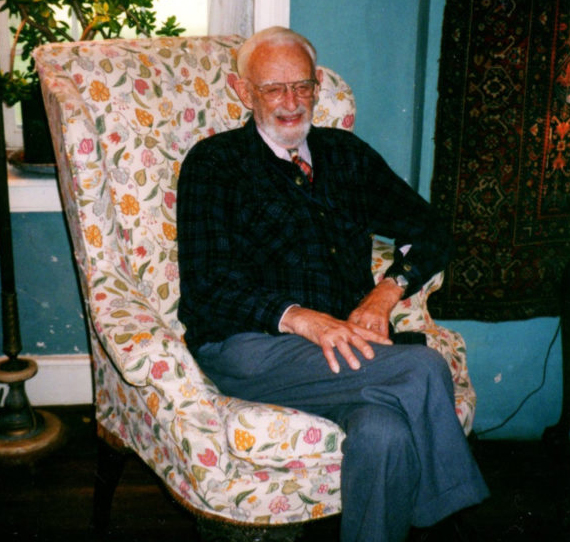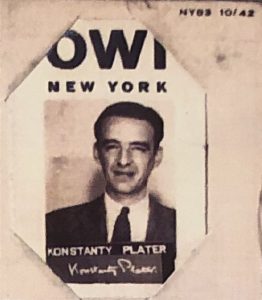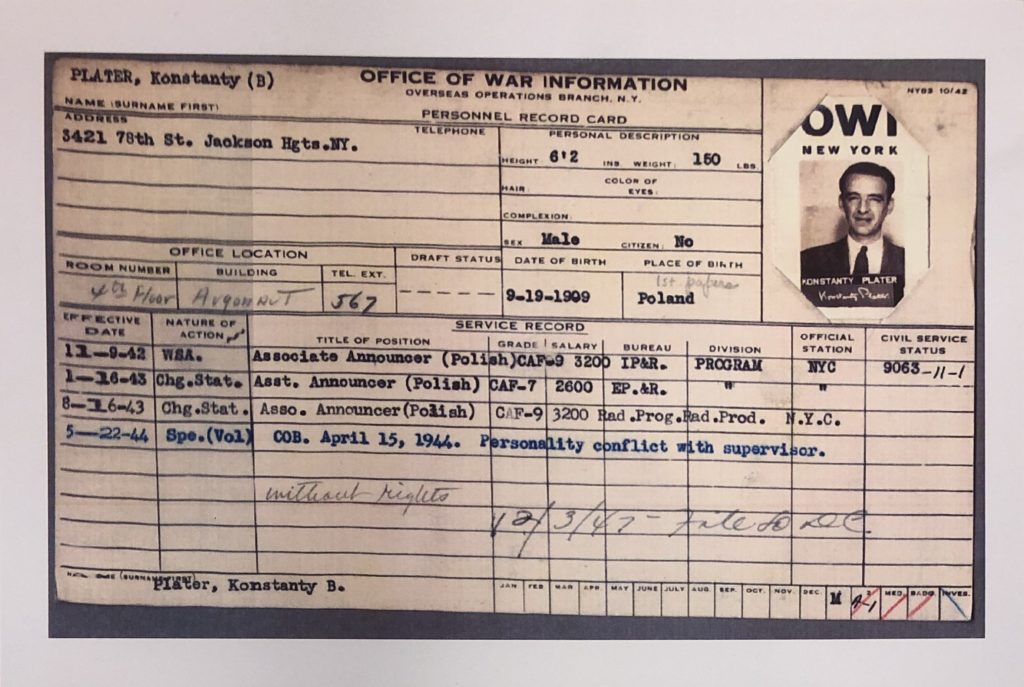Broel Plater Resigns In Protest Against Soviet Propaganda On Voice Of America
 By Ted Lipien for Cold War Radio Museum
By Ted Lipien for Cold War Radio Museum
We know of only one Voice of America (VOA) journalist, Konstanty Broel Plater, who during World War II resigned in protest against being forced by the VOA management and editors in the Office of War Information (OWI) in New York to broadcast Soviet propaganda lies. The effective date of his voluntary resignation from his Polish desk job as a VOA announcer was April 15, 1944. A Jewish-Austrian OWI editor, Julius Epstein, who also protested against Soviet propaganda in VOA’s wartime broadcasts, did not resign but was laid off by the management in 1945.[ref]“How a Refugee Journalist Exposed Voice of America Censorship of the Katyn Massacre,” Cold War Radio Museum (blog), April 16, 2018, https://www.coldwarradiomuseum.com/how-a-refugee-journalist-exposed-voice-of-america-censorship-of-the-katyn-massacre/.[/ref]
According to Broel Plater, prior to his resignation, the OWI office in Washington warned him not to pick a fight with the Voice of America director over VOA’s pro-Soviet programming. A few years before his death, Broel Plater told a Polish-American journalist, who interviewed him at his home in Pennsylvania, that while he worked as a Voice of America announcer in New York, a representative of the Washington office came to see him to discourage him from criticizing VOA broadcasts supporting Soviet propaganda. The Office of War Information manager invited him to lunch and in a short conversation asked him whether he intends to have a fight with the President of the United States and the Voice of America Director. Even after being warned, Broel Plater still tried to struggle with the U.S. government’s radio station’s intensifying pro-Soviet propaganda by pointing out lies and complaining to his supervisors. As a result, working conditions were made worse for him. He was allowed only to work at night and limited to only announcing the program.[ref]Teofil Lachowicz, “Zapomniany dyplomata,” Przegląd Polski (New York), October 20, 2000.[/ref]
Broel Plater’s decision to leave a well-paying U.S. government job in 1944 appeared to have been politically and journalistically motivated as a protest against propaganda and censorship, although his conflict with his supervisor, Edward Raquello, may have played an additional role. The voluntary resignation form signed by Broel Plater said: “I am unable to work to the best of my abilities under Mr. Raquello’s supervision.”
Broel Plater, a Polish aristocrat with a law degree from the prestigious Warsaw University and a former young Polish diplomat in the United States, but also an experienced radio broadcaster who prior to his employment at the Voice of America had written and voiced Polish-American programs for radio stations owned by Columbia Broadcasting System and General Electric, was one of many VOA journalists who had found working with Edward Raquello extremely difficult if not impossible. Unlike many other Voice of America officials, editors, and broadcasters, Raquello was not pro-Stalin, but he implemented the management’s pro-Soviet line. An immigrant from Poland, Raquello fought against the Bolshevik Red Army in the Polish-Soviet War of 1920. Despite conflicts with employees, Raquello had a long and moderately successful career after the war at the Voice of America as a radio production supervisor, and later worked for the United States Information Agency (USIA), assisting foreign correspondents in New York as a USIA information specialist.

Konstanty Broel Plater, Voice of America Polish Service broadcaster who resigned in 1944 in protest against VOA’s airing of Soviet propaganda lies. A 2003 photograph courtesy of Elżbieta Palms.
In a 2000 interview with a Polish-American magazine, Broel Plater said that his objections to Soviet propaganda prompted his resignation from VOA in 1944.[ref]Teofil Lachowicz, “Zapomniany dyplomata,” Przegląd Polski (New York), October 20, 2000.[/ref] His friends described Broel Plater, who died in 2007, as a modest and self-effacing man who did not seek publicity. To support his American family after leaving VOA, he had worked for several years as a laborer on the night shift in a paper mill in Pennsylvania before getting an office job as a lab technician.
“When he started working at the paper mill, his co-workers teased him about being a count,” his Polish-American neighbor Elżbieta Palms recalled from her conversations with him. She also remembered him as being a “very humble man” and saying that his aristocratic title didn’t mean much to him.[ref]Elżbieta Palms, e-mail to Ted Lipien, April 26, 2019.[/ref] One of his sons, Zygmunt J. B. Plater, is Professor of Law at Boston College Law School and an internationally-known environmental law and environmental protection expert whose articles have been cited in Supreme Court opinions.
As a former diplomat, Konstanty Broel Plater knew international politics and also had work experience as a journalist. In March 1943, his supervisor, Casting Director Ruth Ellis, gave him a “Very Good” rating. In submitting a request for a “rapid promotion” for him in August 1943, Ruth Ellis, who was his immediate supervisor, wrote:
Since Mr. Plater has been with OWI (November 1942) he has done consistently good work and has learned our special short wave techniques.
She added that “Mr. Plater’s Polish is excellent and he has been most cooperative.”
Based on his age, education, and prior experience, Broel Plater’s command of Polish was also most likely superior to that of Raquello’s. His immediate supervisor noted Broel Plater’s previous work as a Polish broadcaster, writer, and editor at the Columbia Broadcasting System and his prior work for General Electric as a Polish shortwave announcer “to the complete satisfaction of G.E.”
However, Broel Plater’s next rating in March 1944 was also signed by Edward Raquello as the Regional Supervisor and reduced to “Good,” with only Broel Plater’s diction rated as “Outstanding.” This may have been a hint that Raquello had some objections to Broel Plater’s use of the Polish language, or possibly to changes made by Broel Plater in scripts read live on the air. In his 2000 interview, Broel Plater alluded to texts written in poor Polish, which he had to correct on the fly, but did not mention the names or identities of the VOA writers, and did not mention Raquello. The final personnel form lists “Personality conflict with supervisor,” Edward Raquello, as the reason for Broel Plater’s voluntary departure from the Office of War Information.
At the time when the Soviet Union was America’s most valuable military ally against Nazi Germany, it would have been impossible to make any critical comment in the official U.S. government records about Russia or about Stalin, whom VOA and much of the private media in the United States were then presenting naively and falsely as a defender of freedom and democracy. Broel Plater was convinced that his government secrecy agreement prevented him from discussing his conflict with the Voice of America.
Konstany Broel Plater has never been mentioned in the Voice of America promotional materials or by former and current VOA officials. John Houseman, the Hollywood actor later declared the first VOA director, who had recruited Howard Fast and other Soviet sympathizers and Communists, is still presented as a defender of truthful journalism at the early Voice of America.[ref]Ted Lipien, “First VOA Director Was a Pro-Soviet Communist Sympathizer, State Dept. Warned FDR White House,” Cold War Radio Museum (blog), May 5, 2018, https://www.coldwarradiomuseum.com/first-voa-director-was-a-pro-soviet-communist-sympathizer-state-dept-warned-fdr-white-house/.[/ref]
Voice of America director Amanda Bennett, who served from 2016 to 2020 as an Obama administration appointee, wrote in a Washington Post op-ed in 2018 about World War II VOA:
Those broadcasts were lifelines to millions. Even more important, however, was the promise made right from the start: “The news may be good for us. The news may be bad,” said announcer William Harlan Hale. “But we shall tell you the truth.”[ref]Amanda Bennett, Voice of America Director, “Trump’s ‘worldwide network’ is a great idea. But it already exists.” The Washington Post, November 27, 2018, https://www.washingtonpost.com/opinions/trumps-worldwide-network-is-a-great-idea-but-it-already-exists/2018/11/27/79b320bc-f269-11e8-bc79-68604ed88993_story.html.[/ref]
The fact that FDR’s liberal friends and advisors at the State Department, Under Secretary of State Sumner Welles and Assistant Secretary Adolf A. Berle, forced John Houseman’s resignation by refusing to give him a U.S. passport for official travel abroad—their decision supported by the U.S. Military Intelligence—has never been publicly noted by past or current executives in charge of the Voice of America.[ref]Adolf E. Berle, Navigating the Rapids: 1918-1971, ed. Beatrice Bishop Berle (New York: Harcourt Brace Jovanovic, Inc., 1973), 440. The memorandum about Soviet and communist influence within the wartime Voice of America, signed off with a cover memo by Under Secretary of State Sumner Welles, a distinguished career diplomat and a major foreign policy advisor to President Roosevelt and his personal friend, was forwarded to the White House with the date, April 6, 1943. The attached memorandum with the addendum listing names of individuals who had been denied U.S. passports for government travel abroad was dated April 5, 1943. The documents were declassified in the mid-1970s and have been accessible online for some time from the Franklin D. Roosevelt Library and Museum Website and the National Archives. It appears, however, that they have never been widely disclosed and analyzed before now. They were presented for the first time with historical analysis on the Cold War Radio Museum website. Under Secretary of State Sumner Welles April 6, 1943 memorandum to Marvin H. McIntyre, Secretary to the President with enclosures, Franklin D. Roosevelt Library and Museum Website, Box 77, State – Welles, Sumner, 1943-1944; version date 2013. State – Welles, Sumner, 1943-1944, From Collection: FDR-FDRPSF Departmental Correspondence, Series: Departmental Correspondence, 1933 – 1945 Collection: President’s Secretary’s File (Franklin D. Roosevelt Administration), 1933 – 1945, National Archives Identifier: 16619284. https://catalog.archives.gov/id/16619284.[/ref]
Also, not noted in Voice of America promotional materials, is the employment of Howard Fast as the Voice of America’s first chief news writer and editor. Fast was a best-selling American author who formally joined the Communist Party in 1943 and resigned from VOA in 1944 when the State Department refused to give him a U.S. passport for official government travel. He later served a three-month sentence in federal prison following a conviction for contempt of Congress, and in 1953 received the Stalin Peace Prize. Fast later condemned Stalin and left the Communist Party, but did not abandon his support for Marxism, the Soviet Union, and other communist regimes. He did not return his Stalin Peace Prize.[ref]Ted Lipien, “Howard Fast – Chief of Voice of America News Who Won the Stalin Peace Prize, Voice of America – 80 Years of Hidden History,” Voice of America – 80 Years of Hidden History(blog), accessed January 26, 2022, https://www.voa80.com/2021/12/21/howard-fast-chief-of-voice-of-america-news-who-won-the-stalin-peace-prize/.[/ref]
Perhaps the greatest Soviet propaganda lie, which the Office of War Information and the Voice of America consistently promoted during World War II, was the denial by Stalin and Soviet propagandists that Russia was responsible for the brutal mass murder of about 22,000 Polish POW military officers, government officials, and members of Poland’s intellectual elite. These genocidal murders are collectively known as the Katyn massacre. Partial censorship of the Katyn story continued at the Voice of America after the war, and did not end completely until the start of the Reagan administration. Radio Free Europe (RFE), established during the Truman administration, did not engage in such censorship, and neither did Radio Liberty (RL), which broadcast to the Soviet Union.[ref]Ted Lipien, “Pro-Stalin Voice of America Propaganda Revealed in 1984 VOA Interview with Józef Czapski,” Cold War Radio Museum (blog), September 4, 2018, https://www.coldwarradiomuseum.com/pro-stalin-voice-of-america-propaganda-revealed-in-1984-voa-interview-with-jozef-czapski/.[/ref]
A former Voice of America (VOA) director Sanford J. Ungar, who had served under President Clinton from 1999 to 2001, said in response to a question during a panel discussion on February 3, 2022, organized to commemorate the 80th anniversary of VOA’s first broadcast, that the news about Howard Fast, a World War II VOA chief English news writer and editor receiving the Stalin Peace Prize in 1953, was merely “amusing.”
Some East Europeans, including the Ukrainians, who had lost their freedom after the end of World War II by going from living under Nazi totalitarianism to living under communist totalitarian regimes – a decades-long tragedy made easier for Russia by President Roosevelt’s agreements with Stalin during wartime conferences at Tehran and Yalta – may disagree that the fact of an American Communist activist and journalist working for VOA in a key position was utterly irrelevant. Still, Ungar, who is now the director of The Free Speech Project at Georgetown University, implied that even asking such a question could be proof of “McCarthyism” or “white supremacy.”
Ungar also asserted that there were “no communist spies at the Voice of America” in the early years. Several Soviet spies and many more agents of influence did indeed work at the Office of War Information during World War II, some of them employed in OWI’s Voice of America foreign language services. At least one journalist, Stefan Arski, aka Artur Salman, who was a Soviet agent of influence at the wartime Voice of America, if not an actual agent, later worked as a key anti-American propagandist for the communist regime in Poland.[ref]Ted Lipien, “Voice of America Polish Writer Listed As His Job Reference Stalin’s KGB Agent of Influence Who Duped President Roosevelt,” Cold War Radio Museum(blog), February 12, 2020, https://www.coldwarradiomuseum.com/voice-of-america-polish-writer-listed-as-his-job-reference-stalins-kgb-agent-of-influence-who-duped-president-roosevelt/.[/ref]
Both Konstanty Broel Plater and Howard Fast have been erased from the official history of the Voice of America. The official silence seems to have been imposed in each case for similar and different reasons – all, however, related to the shame over the Yalta Agreement and the desire to cover up scandals because of partisanship (Franklin Delano Roosevelt was a Democrat), institutional loyalty, and protection of well-paying government jobs for officials and journalists. It was, however, the Democratic administration of President Harry S. Truman that, after the embarrassing launch of the first VOA Russian broadcast in 1947, removed the remaining Soviet sympathizers in charge of the Voice of America, hired anti-communist refugee journalists from Eastern Europe, and made VOA programs more hard-hitting against the Soviet Union and Communism.[ref]“Voice Of America Launched Soft Broadcasts to Soviet Russia – Cold War Radio Museum,” Cold War Radio Museum(blog), accessed June 23, 2022, https://www.coldwarradiomuseum.com/voice-of-america-launched-soft-broadcasts-to-soviet-russia/.[/ref]
Still, such official censorship now makes it difficult for new generations of journalists to guard against Russian propagandists working for the ex-KGB officer, and himself a master propagandist, Russia’s President Vladimir Putin. Because the truth has been covered up and forgotten, Putin and his entourage have an easier time manipulating media and public opinion in Russia and in the West to justify the war against Ukraine, the war crimes being committed there by the Russian Army, and the illegal occupation of the Ukrainian territory.
Ted Lipien is a journalist, writer, and media freedom advocate. He was Voice of America’s Polish service chief during Poland’s struggle for democracy and VOA’s acting associate director. He also served briefly in 2020-2021 as RFE/RL president. His book “Wojtyła’s Women” was published in 2008 by O-Books, UK. He is now an independent journalist and a media freedom advocate.




